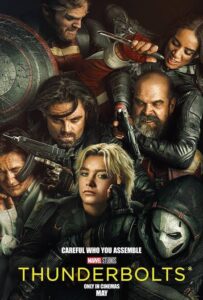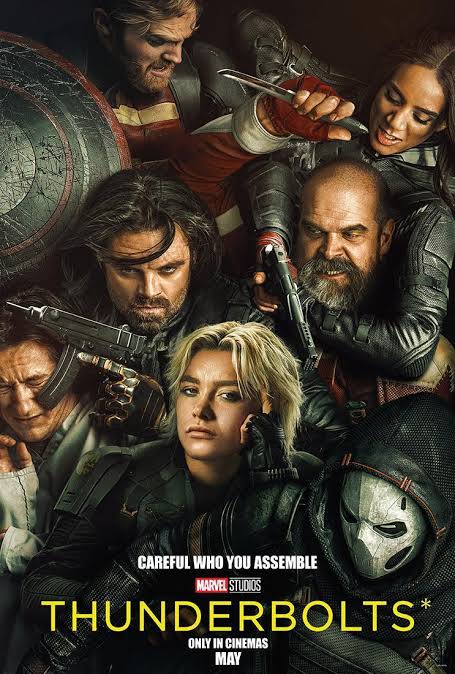Thunderbolts (2025) Review: Marvel’s Misfit Antiheroes Assemble, But Only Yelena Belova Truly Shines

The Marvel Cinematic Universe (MCU) has long mastered the art of assembling heroes. But in Thunderbolts (2025), the studio flips the formula, aiming to explore what happens when you bring together broken tools, moral outcasts, and government pawns—all wearing the façade of redemption. Directed by Jake Schreier and boasting a cast of returning antiheroes, Thunderbolts is Marvel’s attempt at a gritty, complex ensemble thriller.
But while the ambition is there, the execution wobbles. The plot suffers under the weight of too many characters, uneven tone shifts, and a hesitant commitment to darkness. Fortunately, Florence Pugh’s Yelena Belova rises above the noise, delivering a performance so emotionally rich and compelling that it almost redeems the film’s broader flaws.
🎬 Plot Summary (Spoiler-Free)
Set after the political fallout of Captain America: New World Order, the U.S. government—through CIA director Valentina Allegra de Fontaine (Julia Louis-Dreyfus)—forms an off-the-books strike team. Their purpose: handle global threats too morally dubious for the Avengers.
The “Thunderbolts” include:
- Yelena Belova (Florence Pugh), the former Black Widow struggling with her past and purpose.
- Bucky Barnes (Sebastian Stan), tasked with leading the team despite his internal conflicts.
- John Walker / U.S. Agent (Wyatt Russell), still reeling from his public disgrace.
- Ghost (Hannah John-Kamen), plagued by instability.
- Red Guardian (David Harbour), both comic relief and father figure.
- Taskmaster (Olga Kurylenko), more humanized and vocal than before.
Their mission: to take down a secretive Eastern European paramilitary syndicate known as The Rook, which has developed AI-driven surveillance tech capable of reprogramming human behavior—a metaphor for state control and manipulation.
But the real war is internal. Loyalties fray, traumas resurface, and hidden agendas collide.
💥 Florence Pugh’s Yelena: The Film’s Moral and Emotional Core
If Thunderbolts has a soul, it’s Yelena Belova.
Pugh is in total command here. With piercing sarcasm, buried vulnerability, and sudden bursts of emotional honesty, she portrays a woman who’s both assassin and orphan, protector and skeptic. While the script often swerves into genre clichés, Pugh adds layers that the writing doesn’t always earn.
Her scenes with Red Guardian are surprisingly moving, revealing a woman still haunted by the fake family she once called real. Her reluctant bond with Bucky is another highlight—two weapons-turned-wounded-humans, trying to find a path to forgiveness. And her disdain for authority gives her a sharper political edge than many other MCU protagonists.
Marvel has long struggled to center female antiheroes without reducing them to sidekicks or stereotypes. Yelena breaks that mold. She isn’t defined by a love interest or trauma flashback. She’s defined by choice—how she exercises it in a world designed to strip it from her.
🌀 Themes: Identity, Control, and Moral Grayness
Thunderbolts flirts with deep philosophical questions:
- Can a government really redeem the very people it once broke?
- Is it ethical to use former villains to achieve national interests?
- Is redemption a narrative, or a reality?
But sadly, the film doesn’t dig deep enough. While Yelena embodies these themes in action and dialogue, the rest of the ensemble is often underdeveloped. Ghost’s instability is reduced to a few throwaway scenes. Bucky’s inner turmoil is rehashed from earlier films. U.S. Agent is framed as a volatile wildcard, but without clear growth or self-reflection.
This imbalance makes the team feel less like a cohesive unit and more like a collection of underwritten backstories clashing on screen.
🎭 Ensemble Performances: Uneven but Engaging
- Sebastian Stan (Bucky Barnes) brings gravitas but feels underutilized. His arc treads familiar territory.
- Wyatt Russell (U.S. Agent) captures internal conflict well but lacks sufficient screen time.
- David Harbour (Red Guardian) delivers on humor, but the jokes sometimes feel forced.
- Olga Kurylenko (Taskmaster) is finally given lines and motivation—a massive improvement from Black Widow.
- Hannah John-Kamen (Ghost), sadly, is shortchanged with minimal development.
Julia Louis-Dreyfus’s Valentina, though charismatic, is still more concept than character—a Machiavellian schemer without emotional stakes. Her character continues to suffer from being more setup than payoff.
🎥 Direction and Tone: Identity Crisis in a Gritty Package
Jake Schreier, known for more intimate projects, tries to balance the MCU’s big-budget demands with smaller, character-driven moments. The result is a film that almost finds its voice.
Some scenes—particularly Yelena’s nightmares and a haunting flashback to her Red Room days—are brilliantly constructed. Others, like the team’s infiltration sequence or the final CGI-heavy climax, feel generic and rushed.
Tonally, Thunderbolts doesn’t fully commit to its darker edge. Unlike The Winter Soldier or Daredevil, which embraced their seriousness, Thunderbolts constantly undercuts itself with jokes and quips—some of which work, but many of which clash with the film’s heavier themes.
This unevenness hurts the story’s impact. The stakes never feel high enough, the losses don’t sting, and the internal betrayals come off as mechanical rather than emotional.
🎨 Visuals and Score: Functional but Forgettable
The cinematography leans into a muted color palette—grays, deep blues, and washed-out greens. It fits the film’s aesthetic, but it also renders many scenes visually dull. A sequence in a fog-filled forest at night is a rare standout, combining tension, confusion, and style.
The score by Lorne Balfe attempts to give each character a motif, but nothing sticks. The music serves its purpose, but doesn’t elevate the film the way previous MCU scores have (Black Panther or Avengers: Endgame come to mind).
🧩 Pacing and Structure: A Film at War with Its Franchise
The film’s first act is solid: team assembly, internal conflict, political context. The second act drags, overwhelmed by subplots and exposition. The third act is rushed and overly reliant on spectacle.
What’s most frustrating is how often Thunderbolts sabotages its own momentum in order to set up future projects. A cryptic post-credits scene introduces a possible link to Armor Wars and teases a mysterious AI adversary—further muddying the story you just watched.
✅ The Good
- Florence Pugh’s phenomenal performance.
- Yelena-Bucky dynamic is nuanced and believable.
- Moral ambiguity is a welcome departure from standard MCU fare.
- Improved portrayal of Taskmaster.
❌ The Bad
- Too many characters, too little time.
- Tonally inconsistent—dark themes undercut by humor.
- Weak third act reliant on formulaic action.
- Unfulfilled thematic potential.
🔚 Final Verdict: Yelena Deserved a Better Movie, But She Saved This One
Marvel took a bold step with Thunderbolts—and it almost paid off. While the film falters under the weight of its ambitions and the expectations of franchise storytelling, it offers just enough—especially through Yelena—to justify the trip.
Yelena Belova is no longer just Natasha’s shadow. She’s a complex, layered, and fully-formed protagonist in her own right. Florence Pugh elevates every scene she’s in, proving that with the right script, she could carry a solo film effortlessly.
As for the rest? Thunderbolts is messy but watchable. Frustrating but fascinating. A flawed experiment that still deserves recognition for at least trying to shift Marvel’s tone.
⭐ RATING: 6.8/10
- Watch it for Yelena.
- Stay for the moral conflict.
- Don’t expect a revolution.
